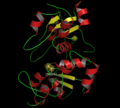Plant senescence is the process of aging in plants. Plants have both stress-induced and age-related developmental aging. Chlorophyll degradation during...
15 KB (2,074 words) - 17:39, 11 January 2024
Senescence (/sɪˈnɛsəns/) or biological aging is the gradual deterioration of functional characteristics in living organisms. Whole organism senescence...
58 KB (7,177 words) - 15:52, 23 May 2025
in leaf senescence, phosphate starvation response, salt tolerance, and light signalling. Other identified plant growth regulators include: Plant peptide...
56 KB (7,026 words) - 09:52, 25 May 2025
Cellular senescence is a phenomenon characterized by the cessation of cell division. In their experiments during the early 1960s, Leonard Hayflick and...
60 KB (6,678 words) - 04:23, 25 May 2025
Plastid (redirect from Plant proplastids)
that control the dismantling of the photosynthetic apparatus during plant senescence. Leucoplasts: colourless plastids that synthesize monoterpenes. Leucoplasts...
29 KB (3,298 words) - 04:56, 1 June 2025
similar to auxins in causing plant growth and senescence of vegetative tissues. This established that ethylene is a plant hormone. Ethylene is produced...
34 KB (3,913 words) - 22:20, 22 May 2025
Monocarpic (redirect from Monocarpic plant)
plants, flowering signals senescence, while in others the production of fruits and seeds causes changes within the plants which lead to death. These...
4 KB (426 words) - 09:58, 10 May 2024
so do the mutants with a damaged regulatory system. The process of plant senescence involves the degradation of chlorophyll: for example the enzyme chlorophyllase...
37 KB (3,755 words) - 16:55, 23 May 2025
role in mature aging tissue and the possibility of being involved in plant senescence. The fungus Chondrostereum purpureum, the causal agent of silver leaf...
11 KB (1,632 words) - 21:14, 8 November 2023
ELF3 (category Plant genes)
pathways that regulate plant flowering. Mutations in ELF3 have also been associated with the speed of plant aging, or plant senescence, through the EC inhibition...
23 KB (2,762 words) - 01:56, 29 March 2024
remains Ramification (botany) Salt pruning Self or natural pruning: Plant senescence#Plant self-pruning and Fire adaptations#Self-pruning branches Thinning...
18 KB (2,462 words) - 02:43, 7 May 2025
on stigmas and export of pollen to fertilize the ovules of other plants. Senescence is one of the main causes of floral color change along with induction...
9 KB (1,015 words) - 03:12, 28 August 2024
Rod Bieleski (section Plant senescence)
investigated physiological changes to plants during senescence. One study completed in 1991 looked at changes during senescence in a Daylily ephemeral flower...
22 KB (1,865 words) - 01:45, 6 April 2025
Polyamine (category Plant hormones)
barrier. They are involved in modulating senescence of organs in plants and are therefore considered as a plant hormone. In addition, they are directly...
15 KB (1,684 words) - 09:23, 17 February 2025
protein HSP-67BB several bacterial cold-shock and phage shock proteins plant senescence associated proteins catalytic and non-catalytic domains of rhodanese...
6 KB (637 words) - 00:28, 8 December 2023
authors, this tradeoff is also relevant for other annual, flowering plants. Senescence refers to the process of physiological change in individual members...
22 KB (2,820 words) - 16:04, 28 November 2024
Negligible senescence is a term coined by biogerontologist Caleb Finch to denote organisms that do not exhibit evidence of biological aging (senescence), such...
15 KB (1,678 words) - 06:20, 3 June 2025
Cladoptosis (category Plant physiology)
thought to have three possible functions: self-pruning (i.e. programmed plant senescence), drought response (characteristic of xerophytes) and liana defence...
3 KB (273 words) - 04:57, 1 June 2025
Edith's checkerspot (section Host plants)
annual host plants senesce. Thus, females try to enhance offspring survival by laying egg masses on cool moist slopes where host plant senescence is most...
26 KB (3,045 words) - 20:14, 27 May 2025
the plants can then reabsorb them through their roots. Therefore, nutrient reabsorption during senescence presents an opportunity for a plant's future...
31 KB (3,646 words) - 15:59, 26 May 2025
different arthropods. Detritus resulting from plant senescence is the major source of soil organic carbon. Plant materials, with cell walls high in cellulose...
39 KB (4,380 words) - 16:09, 21 May 2025
plant. This type of damage is caused by many other leafhopper species and it is called hopperburn. Symptoms of hopperburn resembles plant senescence and...
15 KB (1,843 words) - 04:43, 19 April 2025
Cytokinin (category Plant hormones)
differentiation, but also affect apical dominance, axillary bud growth, and leaf senescence. There are two types of cytokinins: adenine-type cytokinins represented...
18 KB (1,974 words) - 21:28, 24 May 2025
process by producing adventitious roots, unwanted callus at the base, or senescence of the foliage. The pH is another important factor that may affect organogenesis...
43 KB (5,642 words) - 04:17, 25 May 2025
List of longest-living organisms (redirect from Oldest plant)
Martínez, Daniel E. (1998). "Mortality patterns suggest lack of senescence in Hydra". Experimental Gerontology. 33 (3): 217–225. CiteSeerX 10.1.1...
80 KB (8,263 words) - 05:54, 26 May 2025
Gibberellin (category Plant hormones)
flowering, flower development, and leaf and fruit senescence. They are one of the longest-known classes of plant hormone. It is thought that the selective breeding...
37 KB (4,395 words) - 13:19, 23 May 2025
Chlorophyll Degradation from Other Senescence Processes in Leaves of a Mutant Genotype of Meadow Fescue (Festuca pratensis L.)". Plant Physiology. 56 (3): 438–441...
13 KB (1,221 words) - 10:24, 27 May 2025
conditions, ranging from 5–20 days. After flowering leaf and root senescence sets in, and the plant appears to be 'dormant' until the next spring, conserving...
257 KB (23,880 words) - 22:24, 22 May 2025
Programmed cell death (redirect from Cell senescence and death)
that the digits are separate. PCD serves fundamental functions during both plant and animal tissue development. Apoptosis and autophagy are both forms of...
57 KB (6,843 words) - 01:20, 5 June 2025
for his research contribution in the field of plant nanotechnology and molecular biology of leaf senescence. He has been recognized as an Academia Sinica...
9 KB (934 words) - 09:16, 29 May 2025





















